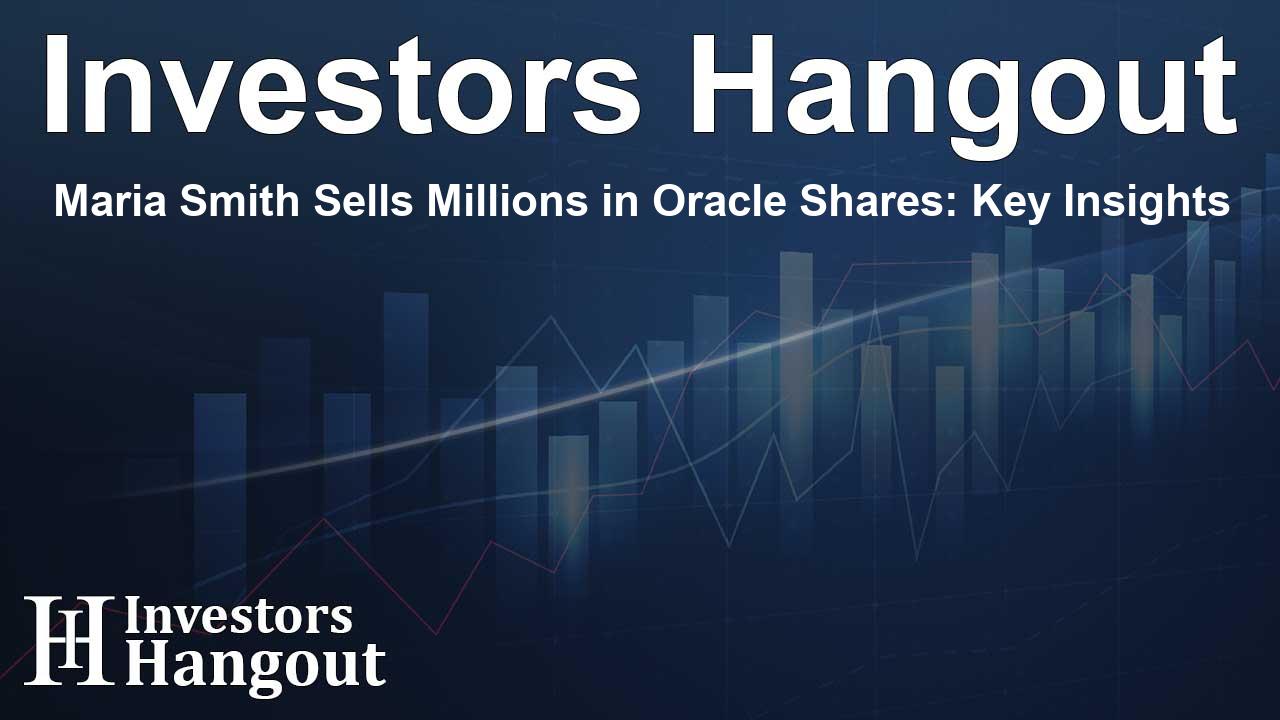Maria Smith Sells Millions in Oracle Shares: Key Insights

Maria Smith's Significant Sale of Oracle Stock
Maria Smith, an Executive Vice President at Oracle (NYSE: ORCL), recently completed a notable insider transaction, as confirmed by a filing with the SEC. This decision involved selling 10,000 shares, equating to a substantial total transaction value of $2,803,122. This type of activity draws attention from investors and industry analysts alike.
An Overview of Oracle Corporation's Operations
Founded in 1977, Oracle is a leading provider of enterprise applications and IT infrastructure. The company's offerings include cloud-based, on-premises, and hybrid deployment models, catering to a broad range of enterprise needs. Oracle is renowned for developing the first commercial SQL database management system, which is utilized by many of the largest corporations worldwide for managing high-volume transactions.
Core Services Offered by Oracle
Oracle's product range extends beyond databases to include enterprise resource planning (ERP) platforms and cloud services, which are becoming increasingly vital in supporting large language model training and application. This multifaceted approach positions Oracle as a key player in the evolving landscape of IT and enterprise solutions.
Current Financial Performance of Oracle
Examining Oracle's financial health reveals mixed results. Over the past three months, the company reported a revenue growth rate of 12.17%. While this growth is promising, it remains below the average growth rates seen among its peers in the Information Technology sector.
Profitability Challenges and Metrics
Oracle's gross margin currently stands at 67.28%, highlighting concerns related to cost efficiency and profitability compared to competitors. Furthermore, the company’s earnings per share (EPS) is 1.04, which also lags behind industry benchmarks, indicating potential challenges in sustaining earnings growth going forward.
Debt Management and Valuation Insights
The company's financial structure also raises questions, particularly reflected in its debt-to-equity ratio of 4.36. This high level of debt suggests challenges in managing financial liabilities and may affect investor confidence moving into the future.
Valuation Metrics Overview
Investors often analyze valuation metrics to gauge stock health. Oracle's Price to Earnings (P/E) ratio is 64.83, which is lower than the industry average, suggesting that Oracle stock may be undervalued. Meanwhile, its Price to Sales (P/S) ratio is 13.67, indicating potential investment opportunities amid current pricing trends.
Understanding Insider Transactions and Their Implications
Insider transactions, while not the sole determinant for investment decisions, can offer valuable insights about a company's prospects. Executives and significant shareholders are required by law to report their transactions, providing transparency to investors regarding insider sentiment towards stock performance.
The Importance of Transaction Awareness
For investors monitoring these transactions, details found within SEC filings, such as Form 4, are essential. The classification of transactions helps decode the market. For instance, a code 'P' indicates a purchase, whereas an 'S' signifies a sale. These indicators guide investors to assess whether insiders are confident about future growth or concerned about potential declines.
The Broader Market Context
Despite the insider sell, it's essential to maintain perspective. Market performance and company valuations can fluctuate based on various external and internal factors. Keeping a keen eye on broader market trends and indicators can support informed investment strategies. The interplay of financial health, market performance, and insider activity forms a complex narrative that impacts how shares, including those of Oracle, are viewed by both investors and analysts alike.
Frequently Asked Questions
What prompted Maria Smith to sell her Oracle shares?
While specific reasons weren't provided, insider sales can be influenced by personal financial strategies, tax planning, or other private matters.
How does Oracle's recent financial performance compare to its competitors?
Oracle's recent revenue growth is notable but still lags behind several peers in the Information Technology sector, reflecting competitive challenges.
What are the main products offered by Oracle?
Oracle provides a range of services including database management systems, cloud services, and enterprise resource planning solutions.
Why are insider transactions significant for investors?
Insider transactions can provide insights into executives' views on the company's future and serve as indicators for potential investment opportunities.
What does a high debt-to-equity ratio indicate for a company?
A high debt-to-equity ratio suggests that a company relies significantly on borrowed funds, which may pose risks related to financial stability and investor confidence.
About The Author
Contact Addison Perry privately here. Or send an email with ATTN: Addison Perry as the subject to contact@investorshangout.com.
About Investors Hangout
Investors Hangout is a leading online stock forum for financial discussion and learning, offering a wide range of free tools and resources. It draws in traders of all levels, who exchange market knowledge, investigate trading tactics, and keep an eye on industry developments in real time. Featuring financial articles, stock message boards, quotes, charts, company profiles, and live news updates. Through cooperative learning and a wealth of informational resources, it helps users from novices creating their first portfolios to experts honing their techniques. Join Investors Hangout today: https://investorshangout.com/
The content of this article is based on factual, publicly available information and does not represent legal, financial, or investment advice. Investors Hangout does not offer financial advice, and the author is not a licensed financial advisor. Consult a qualified advisor before making any financial or investment decisions based on this article. This article should not be considered advice to purchase, sell, or hold any securities or other investments. If any of the material provided here is inaccurate, please contact us for corrections.
